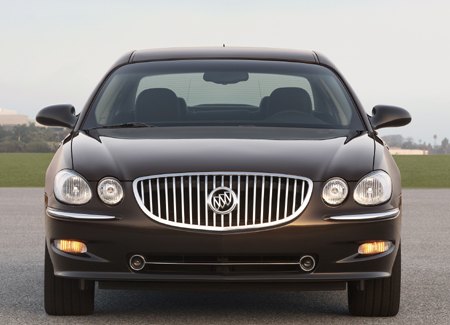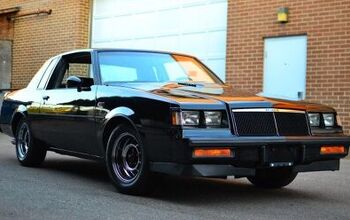Buick and the Detroit Zombies
There’s an often-repeated statistic: U.S. Buick dealers sell just four cars per dealer per month. It’s true, but c’mon; that was last year’s totals. In March, Buick sales slipped to three cars per dealer. Thanks to TTAC’s Frank Williams, I’ve had a chance to examine the exact dealer and sales stats for the Beyond Precision people. Having deconstructed the data, I can declare that this seemingly absurd three cars a month number, while strictly true, isn’t the whole story. The “whole story” is much worse.
First, to be strictly accurate, the 36 cars per Buick dealer per year stat doesn’t include trucks. Add-in Enclave sales and you’re up to 60 sales per dealer per year. (Only Ferrari, Isuzu and Rolls have lower averages.) You may wonder how any car dealer could survive on such meager portions. The short answer is, they don’t. GM’s 90 “exclusive” Buick dealers sell quite a bit more than a car per week. The problem isn’t these Buick stores; it’s the “dualed” and “tripled” Buick franchises; 29 of them for every solo dealer.
To help you wrap you mind around those numbers, there are over 2700 places where you could, if pressed, buy a Buick. That “coverage” includes as many franchises as Toyota, Lexus, Honda and Acura. Combined. All to support numbers slightly larger than sales of Honda’s Odyssey. The scariest part ISN’T that the average Buick dealer sells a car a week (probably less). The bigger problem is that these franchises can survive selling so few.
One of the less-mentioned side effects of The Big 2.8’s massive brand spread and bloated dealer networks: “franchise bloat.” GM, Ford, Chrysler have about 6500, 4000 and 3500 “dealerships” (i.e. buildings) respectively. Toyota/Lexus and Honda/Acura have about 1100 stores each; Nissan/Infiniti 1000. Now, let's talk franchises. Detroit automakers have 13,000, 6800 and 8300 franchises. Toyota clock in at about 1500; Honda and Nissan have about 1200 franchisees.
Franchise glut means dealers are frequently bidding against each other on price, and fighting for product allocation. But there’s an even bigger downside for Detroit: multiple franchises give dealers greater leverage. A dealer receiving cars from two or more streams can concentrate their efforts where it’s most profitable (e.g. on whichever line is getting a marketing boost at the moment). The languishing brands can be milked for limited-allocation cars until a particular model catches fire. Or, in Buick’s case, not.
While it's been argued that single-line dealers lead to too many models spread across too many price points, at least a single-line car dealer can’t play Peter off against Paul at similar price points. In other words, they’re not hurting one brand by helping another.
But the single biggest problem caused by franchise bloat down Detroit way is that it’s made killing brands more difficult, rather than easier.
In theory, bringing in additional lines reduces the damages dealers can claim when you kill a given brand (Chrysler did this when axing Eagle). Yes, but– lopping off brands does nothing to trim the bloated number of dealers. A two or three-headed dealer may not be a money machine, but there is no real way to “starve” it.
So, when you get right down to it, the real obstacle to killing Buick isn’t those 90 stand-alone dealers. They can be bought. It’s the 2600 other guys who will still be selling GM cars when the smoke clears.
Having to pay off 2700 dealers to reduce the “footprint” by less than 100 wouldn’t work even when GM was flush. Ford is in better shape; they at least only have effectively two brands (Mercury does not exist away from Lincoln or Ford). Of course, that makes terminating Mercury completely useless from the “reducing dealers” standpoint. And pity poor Chrysler/Cerberus. It really is a three-headed dog; some 75 percent of their dealerships are multi-branded, often offering all three marques.
Hang on. If franchise glut is such an enormous problem for Detroit, why is GM consolidating their dealer networks (Buick/ Pontiac/GMC; Cadillac/Saab/Hummer)? Hell if I know. The new multi-franchise system leaves GM with the same dealer glut as before. And now, if they really want to cut Buick dealers, they’ll have to kill Buick AND Pontiac AND GMC together.
In the meantime GM will have four competing “mainstream” distribution channels (including Chevy and Saturn). Well, at least sending one or two of these mega-franchises into that long good night is [theoretically] doable. Ford and Chrysler lack even that option.
And so three-cars-per-dealer Buick is, at the end of the day, a zombie. And now that GM (and Chrysler) doesn’t have the multiple billions needed to make these problems go away, there’s only way out of this entire over-dealered, over-franchised mess. But will anyone buy a car from a bankrupt automaker? From Buick NA’s perspective, it doesn’t really matter anymore. Now that’s scary.
More by Andrew Dederer
Latest Car Reviews
Read moreLatest Product Reviews
Read moreRecent Comments
- Tassos Tim is not that good with colors.The bright "pink" is not pink, but FUCHSIA. Both colors may look good on a woman's sweater, but not on steel panels.
- Tassos While I was a very satisfied owner of a much earlier Accord COupe 5 speed (a 1990 I owned from 1994 to 2016), I don't like the exterior styling of this one so much, in fact the 2017 sedan looks better. Or maybe it sucks in white. The interior of my 1990 was very high quality, this one looks so-so. The 157 k miles were probably easy highway miles. Still, Hondas are not Toyotas, and I remember the same service (like timing belt replacement) back then cost TWICE for an Accord than for a Camry. Add to this that it has the accursed CVT, and it's a no. Not that I am in the market for a cheap econobox anyway.
- 3-On-The-Tree My 2009 C6 corvette in black looks great when it’s all washed and waxed but after driving down my 1.3 mile long dirt road it’s a dust magnet. I like white because dust doesn’t how up easily. Both my current 2021 Tundra and previous 2014 Ford F-150 3.5L Ecobomb are white
- Bd2 Would be sweet on a Telluride.
- Luke42 When will they release a Gladiator 4xe?I don’t care what color it is, but I do care about being able to plug it in.


































Comments
Join the conversation
SAAB95JD
Personally I think it's pretty sad - first the Olds disappears and now Buick, Pontiac, and GMC are on the chopping block. I can remember as a kid when seeing any one of those brands parked in a driveway represented a "well-to-do" family. It appears that every domestic auto manufacturer is on the brink of elimination which is another sad fact of life - soon we'll be as totally dependent on imported vehicles as we are on imported petro. I'm struggling to find the silver lining.